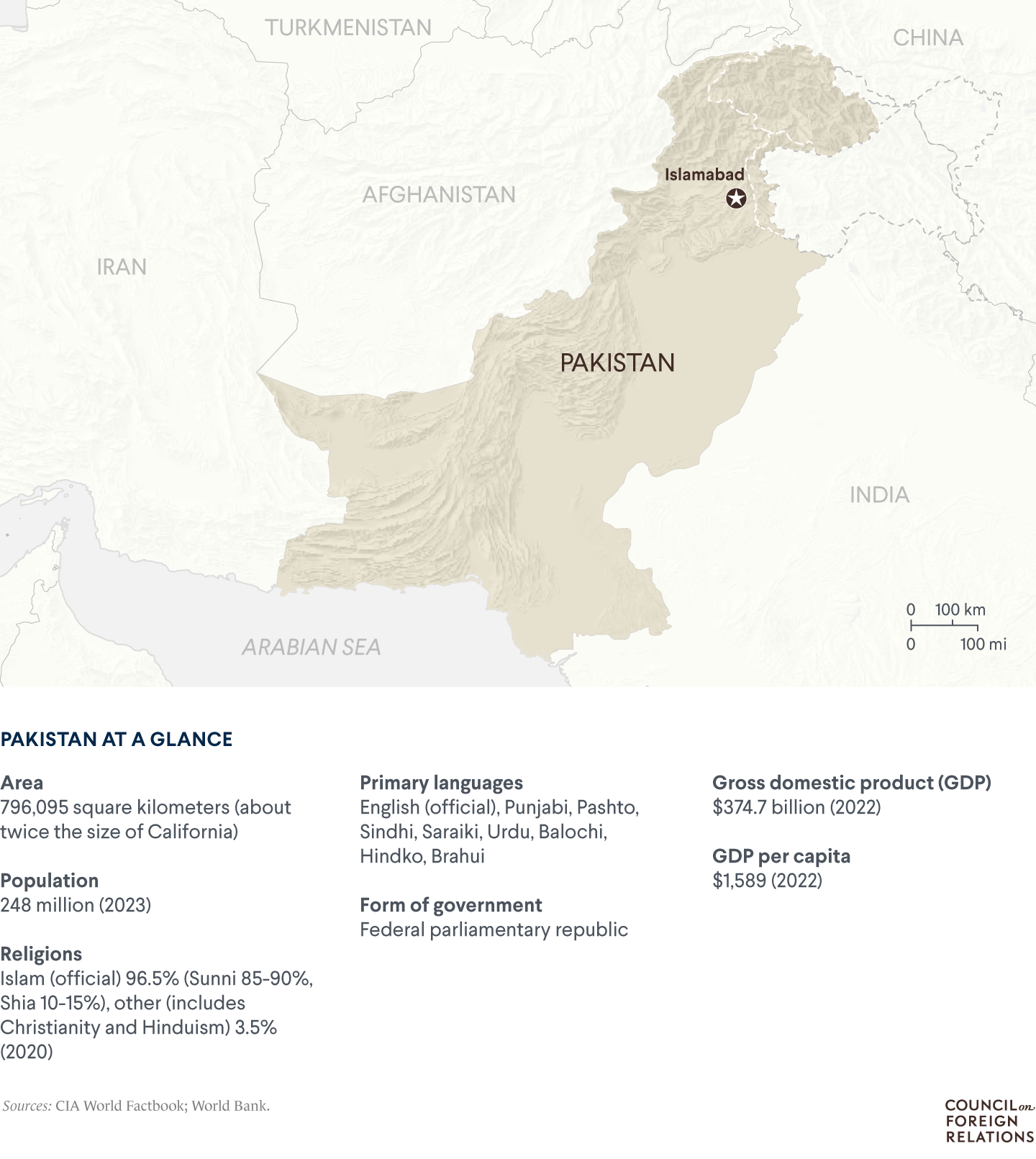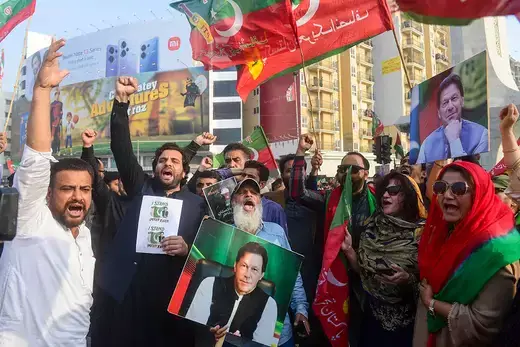Pakistan Is on Edge Ahead of 2024 Elections
Pakistan’s military is set to again play kingmaker in elections that will determine how the nuclear-armed country grapples with an economic crisis, political upheaval aggravated by the arrest of Imran Khan, and escalating terrorism.
On February 8, Pakistan’s voters will elect a leader tasked with managing one of the country’s worst-ever economic crises, an escalating terrorism problem that has recently kindled tensions with Afghanistan and Iran, and a long-standing border impasse with India. But with former Prime Minister Imran Khan barred from participating and the military maneuvering behind the scenes, international observers say the elections will likely be neither free nor fair.
Who are the contenders for prime minister?
Three major candidates have announced plans to run in the parliamentary elections in the hopes of leading the next governing coalition as prime minister. However, only two are eligible for election.
Nawaz Sharif. The front-runner, Sharif is a three-time former prime minister who recently returned from exile in the United Kingdom, where he fled in 2019 after losing backing from Pakistan’s influential military and being charged with corruption. Experts including Senior Advisor at the U.S. Institute of Peace and former CFR Fellow Daniel Markey say Sharif has since mended ties with the military and is now acting as its proxy. Sharif is running on the ticket of a party he founded, the center-right Pakistan Muslim League Nawaz.
Bilawal Bhutto Zardari. The son and grandson of former Pakistani prime ministers, Bhutto is the candidate for the center-left Pakistan People’s Party.
Imran Khan. Khan is by far the most popular politician in Pakistan and was the last elected prime minister, but he will not be on the February ballot. His term ended with a vote of no confidence after he lost the support of the military in 2022 and he was arrested and sentenced to prison on corruption charges, a move that his supporters say are politically motivated. Islamabad’s electoral commission has banned Khan and many other candidates from his Pakistan Tehreek-e-Insaf (PTI) party from politics.

What’s at stake?
The elections come amid a spiraling economic crisis and a worsening security situation. In the past two years, the Pakistani rupee dropped to a record low; inflation soared as food, fuel, and medicine costs spiked; foreign reserves shrank; the country approached default several times; floods wrought tens of billions of dollars in damages; and blackouts caused significant disruptions. As prime minister, Khan railed against an International Monetary Fund (IMF) loan program Pakistan had entered in 2019, and subsequent efforts to rejoin it have been accompanied by steep austerity measures.
Meanwhile, Pakistan’s largely ungoverned western border regions are again at the center of fears of destabilizing conflict. Terrorist attacks killed more than 1,500 people in 2023, the deadliest year for terrorism-related fatalities in the country since 2016. Tensions with Afghanistan over its alleged support for terrorist groups led Pakistani officials to order the deportation of almost two million Afghan migrants in late 2023. In January 2024, Tehran bombed what it said were separatist militants in Pakistan, and Islamabad responded by bombing separatist targets of its own in Iran—the first air strikes on Iranian soil in almost four decades.
These threats could redraw attention to the military’s kingmaking role in elections. The army is the country’s most popular institution, consistently polling far above politicians, courts, and the electoral commission. Khan has sought to change this balance of power, including by stirring protests against the military’s influence in politics. If Khan succeeds in challenging the military, there is a possibility that “the whole system comes tumbling down, and it becomes a revolutionary moment,” Markey says.
Can Pakistan expect fair and free elections?
Experts say it is unlikely. According to the global democracy watchdog Freedom House, Pakistan’s electoral process is considered “partly free.” While it holds regular elections, the country operates under a “hybrid rule” between the military and civilian government, and no elected prime minister has completed a full term.
The shifting treatment of Khan and Sharif is a case in point. In 2018, the military apparatus shepherded Khan to power via electoral manipulation and corruption charges against Sharif and his allies; now Sharif is back in its good graces and Khan has been disqualified. The Supreme Court struck down a previous lifetime ban on those with criminal convictions contesting elections, carving a path for Sharif’s candidacy, while authorities have found a range of procedural ways to hobble the PTI’s campaign and stifle any pro-Khan organizing.
Meanwhile, there is still a possibility that the elections could be delayed for a third time since the original November 2023 date. “The sense in Pakistan is that the election will be held once the establishment has finished sidelining Khan and can be assured that an election will yield its desired outcome of a Sharif victory,” writes Brookings Institution fellow Madiha Afzal.
How could the elections affect Pakistan’s bilateral relationships?
The United States. Pakistan was a leading recipient [PDF] of U.S. aid for much of the twenty-first century amid the war in Afghanistan, but tensions grew over what Washington felt was Islamabad’s lack of initiative against militant groups during the war. Relations worsened further under Khan as he criticized the United States and attempted to form closer ties with China. Pakistan has also recently distanced itself from President Joe Biden’s efforts to promote democracy globally. Some experts say Washington has decided to tread softly on Islamabad’s electoral issues, in contrast with its assertive stance on Bangladesh’s recent elections, to avoid a deeper political crisis.

India. Decades of tension between the two nuclear-armed powers had threatened to boil over during the 2019 cross-border conflicts in Kashmir. But India will also be holding general elections this year, and some analysts argue that under a Sharif administration, another term for incumbent Prime Minister Narendra Modi holds the potential for a normalization of relations.
China. Beijing has become one of Islamabad’s most important allies, providing military assistance and billions of dollars of investment through China’s Belt and Road Initiative (BRI) global infrastructure push. Some BRI projects, such as the China-Pakistan Economic Corridor, have slowed and even stalled in recent years, but analysts say that a new Sharif government could put these projects back on track and potentially accelerate cooperation with Beijing.
Will Merrow and Michael Bricknell created the graphics for this In Brief.